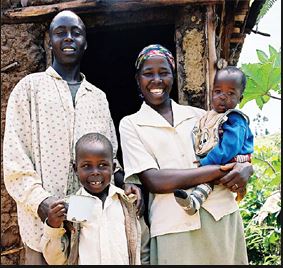| Social relations |
|---|
| The family |
| The clan system |
| Cultural artifacts |
| Education |
| The school |
| Assessment questions |
In many parts of the world, the family is viewed as the most important unit of the society. There are three types of families:
1. Nuclear family: The nuclear family is made up of mother, father and their children. These children include sons and daughters.
2. Extended family: This adds to the nuclear family to include grand-parents, aunts, uncles, cousins, nephews, nieces, grand-daughters, grand-sons, great grand-sons, great grand-daughters, step-sisters, step-brothers, step-sons, step-daughters, sisters-in-law and brothers-in-law.
3. Single parenthood: It is made up of a single parent (father or mother) and children. Single parenthood can be caused by death of one parent, separation or divorce. Some parents choose not to be married.

There are two types of family needs, basic needs and secondary needs. Basic needs are those things that people need in order to survive. These include shelter, food, clothing, water and air.
Food: If we eat balanced diet, we remain healthy and strong. We must always make sure that food is well cooked. We must also keep our food covered to keep away flies and germs.
Clothing: Clothes depend on the culture and climate of the area where people live. For example, in cold areas, people need to keep themselves warm. In hot areas, people wear light clothes. In traditional African societies, people wore clothes made from animal skins and tree barks. In modern societies, people’s way of dressing fits in with the people’s way of life.
Water: Water is an important resource because we cannot live without it. We use water for drinking, cooking and cleaning. Animals also drink water. We need to drink clean water. We must also conserve water to make sure that it does not run out.
Shelter: People need shelter to protect them from extreme weather. It protects people in times of rain or when it is very hot. The types of shelter that people build are influenced by the following factors:
These are the other needs of the family. They include;
Although we may not die without these needs, they are important if we have to develop into good and responsible citizens.
Responsibilities of parents;
Responsibilities of children;
Children learn their roles in the society through observing adults.